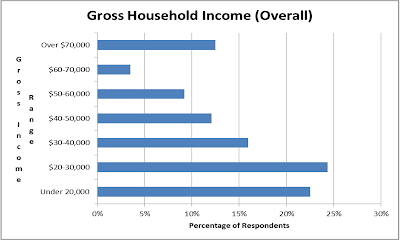Back in 2013, the Langley Seniors Community Action Table, Langley Seniors Resource Centre, and the local chapter of CARP came together to develop solutions that provide affordable, accessible, and appropriate housing for older people in Langley. The Triple A Seniors Housing workgroup was formed. Langley has a large population of seniors which is growing rapidly.
People would like to age in place; maintaining relationships with friends and family, and retaining access to shops, services, recreation, and entertainment. The Township of Langley developed an Age-Friend Strategy which attempted to present solutions to allow people to age in place with dignity. I thought that the strategy didn’t go far enough.
 |
| Gross household income of people surveyed. Select graph to enlarge. |
The Triple A Seniors Housing workgroup also wanted more to be done. Between October 2013 and 2014, the workgroup surveyed 514 seniors in the community. The survey looked at demographic, housings, and income. The results of the survey were recently released. The findings of the survey are:
- Affordability is a large concern for the majority of respondents in the low-income range. 52 percent of all respondents indicated that they spent more than 30 percent of their gross household income on housing costs. 75 percent of those in the $30,000 or less income range spend over 30 percent of their household income on accommodations. In the $0-$40,000.00 group, 67 percent find themselves in the same boat.
- Seniors in our community are ‘making ends meet’ by cutting back on the necessities of life. 215 people overall indicated they cut back on living costs such as food and prescriptions giving housing a spending priority, perhaps to avoid eviction and homelessness. 34 percent of those with income of $30,000 or less cut back on these expenses.
- The need for accessible housing is a priority of many residents as they look forward to aging in place and their health and mobility changes. 37 percent of survey respondents indicated personal limitations that might affect where they live, the majority being mobility related.
- Seniors in our community are not accessing financial supports designed to assist low-income renters and homeowners to provide for their housing needs. Only 42 out of 517 reported receiving government assistance for housing with approximately half naming SAFER as the source. None reported receiving HAFI. A recent study by the Seniors Advocate found that many seniors are not aware of these programs.
- Most senior respondents would prefer to remain in their present community as they age and regardless of income, they are hoping to move to assisted living when they are no longer able to live independently. Recent research by BC’s Seniors Advocate raises concern about admission regulation that restrict the provision of service that would support aging –in-place and avoid or delay referral to residential care (i.e. nursing home).
- Safety, a vital aspect of appropriate housing, was a concern to 20 Langley City respondents who felt unsafe in their home. Current reports indicated that while violent crimes, including home invasions are decreasing, property theft (mail, auto, business break-and-enters) are increasing substantially.
- Secondary suites are not a popular housing option for seniors.

Preferred housing types of people surveyed by income bracket. Select graph to enlarge. - The majority of seniors who plan to move in the next 5 years would choose to own, and 47 percent expressed a preference for rental housing, often for reasons of affordability.
For more details, please check out the full report. The workgroup also developed another report which presents solutions to providing triple A housing for older people in Langley. I’ll post about that tomorrow.

No comments:
Post a Comment